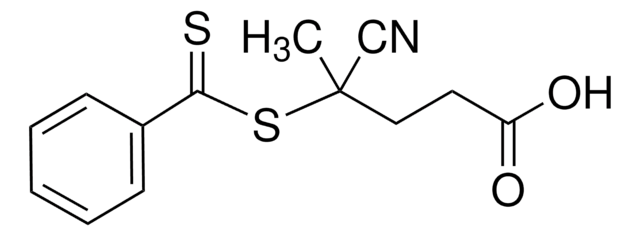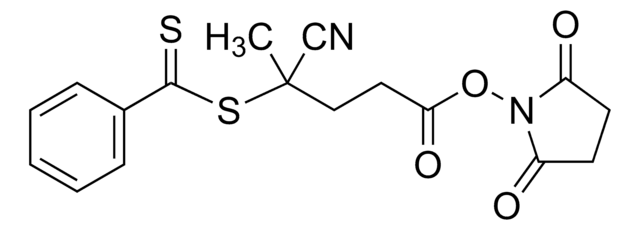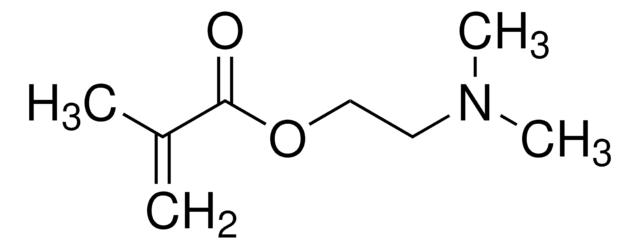741698
2-(Dodecylthiocarbonothioylthio)-2-methylpropionic acid 3-azido-1-propanol ester
98% (HPLC)
About This Item
Recommended Products
Quality Level
Assay
98% (HPLC)
form
liquid
refractive index
n20/D 1.528
density
1.058 g/mL at 25 °C
storage temp.
2-8°C
SMILES string
CCCCCCCCCCCCSC(=S)SC(C)(C)C(=O)OCCCN=[N+]=[N-]
InChI
1S/C20H37N3O2S3/c1-4-5-6-7-8-9-10-11-12-13-17-27-19(26)28-20(2,3)18(24)25-16-14-15-22-23-21/h4-17H2,1-3H3
InChI key
HQKDQLOBIDMFQX-UHFFFAOYSA-N
Related Categories
General description
Application
Storage Class Code
10 - Combustible liquids
WGK
WGK 3
Flash Point(F)
Not applicable
Flash Point(C)
Not applicable
Choose from one of the most recent versions:
Already Own This Product?
Find documentation for the products that you have recently purchased in the Document Library.
Customers Also Viewed
Articles
The modification of biomacromolecules, such as peptides and proteins, through the attachment of synthetic polymers has led to a new family of highly advanced biomaterials with enhanced properties.
We presents an article about a micro review of reversible addition/fragmentation chain transfer (RAFT) polymerization. RAFT (Reversible Addition/Fragmentation Chain Transfer) polymerization is a reversible deactivation radical polymerization (RDRP) and one of the more versatile methods for providing living characteristics to radical polymerization.
Applying ARGET ATRP to the Growth of Polymer Brush Thin Films by Surface-initiated Polymerization
We presents an article about Copper(I)-mediated Living Radical Polymerization in the Presence of Pyridylmethanimine Ligands, and the emergence of living radical polymerization mediated by transition metal catalysts in 1995, which was a seminal piece of work in the field of synthetic polymer chemistry.
Protocols
We present an article about RAFT, or Reversible Addition/Fragmentation Chain Transfer, which is a form of living radical polymerization.
We presents an article featuring procedures that describe polymerization of methyl methacrylate and vinyl acetate homopolymers and a block copolymer as performed by researchers at CSIRO.
An article about the typical procedures for polymerizing via ATRP, which demonstrates that in the following two procedures describe two ATRP polymerization reactions as performed by Prof. Dave Hadddleton′s research group at the University of Warwick.
Our team of scientists has experience in all areas of research including Life Science, Material Science, Chemical Synthesis, Chromatography, Analytical and many others.
Contact Technical Service


![4-Cyano-4-[(dodecylsulfanylthiocarbonyl)sulfanyl]pentanoic acid 97% (HPLC)](/deepweb/assets/sigmaaldrich/product/structures/204/925/30ae6ca0-5b0b-4963-a061-7e5e3d1a85af/640/30ae6ca0-5b0b-4963-a061-7e5e3d1a85af.png)





![4-Cyano-4-[(dodecylsulfanylthiocarbonyl)sulfanyl]pentanol](/deepweb/assets/sigmaaldrich/product/structures/839/520/64c23004-f340-460f-a379-8670a35d0433/640/64c23004-f340-460f-a379-8670a35d0433.png)
![Pentaerythritol tetrakis[2-(dodecylthiocarbonothioylthio)-2-methylpropionate] 97% (HPLC)](/deepweb/assets/sigmaaldrich/product/structures/234/301/a6e20d26-df1b-49c6-bdee-c98dd3488cc2/640/a6e20d26-df1b-49c6-bdee-c98dd3488cc2.png)